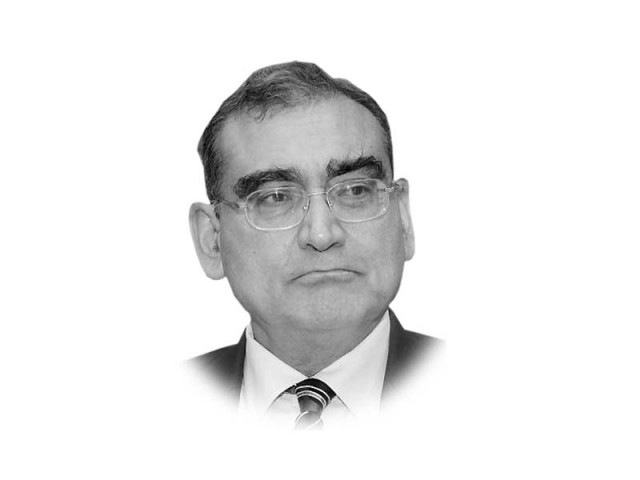The philosophy of judicial restraint
If judiciary crosses limits, there will be reactions which may damage judiciary, its independence, respect in society.

The philosophy of judicial restraint
In a recent statement, the Chief Justice has said that it is the Constitution, not Parliament, which is supreme in the country. There is no controversy about this legal position, and indeed that is the settled law since the historical decision of the US Supreme Court in Marbury vs. Madison (1803).
The grave problem, however, which courts are often faced with is this: on the one hand, there is no doubt that the Constitution is the supreme law of the land and prevails over statutes and executive decisions, and it is for the Courts to interpret the Constitution. On the other hand, in the garb of interpretation, the Court must not seek an unnecessary confrontation with the legislature, particularly since the legislature consists of representatives democratically elected by the people.
The solution to the problem was provided in the classical essay written in 1893 (and published in the Harvard Law Review the same year) by James Bradley Thayer, then professor of law of Harvard University, entitled “The Origin and Scope of the American Doctrine of Constitutional Law”. This essay elaborately discusses the doctrine of judicial restraint and explains why courts should follow it.
Justice Oliver Wendell Holmes, Louis Brandeis and Felix Frankfurter of the US Supreme Court were followers of Professor Thayer’s philosophy of judicial restraint. Justice Frankfurter referred to Thayer as “the great master of Constitutional Law” and in a lecture at Harvard Law School said:
“If I were to name one piece of writing on American Constitutional Law, I would pick Thayer’s once famous essay, because it is a great guide for Judges, and therefore the great guide for understanding by non-judges of what the place of the judiciary is in relation to Constitutional questions.”
The Court certainly has power to decide Constitutional issues. However, as pointed out by Justice Frankfurter in West Virginia State Board of Education vs. Barnette 319 US 624 (1943), since this great power can prevent the full play of the democratic process, it is vital that it should be exercised with rigorous self-restraint.
The philosophy behind the doctrine of judicial restraint is that there is broad separation of powers under the Constitution and the three organs of the State, the legislature, the executive, and the judiciary must respect each other and must not ordinarily encroach into each other’s domain, otherwise the system cannot function properly. Also, the judiciary must realise that the legislature is a democratically-elected body which expresses the will of the people (however imperfectly) and in a democracy this will is not to be lightly frustrated or thwarted.
Apart from the above, as pointed out by Professor Thayer, judicial overactivism deprives the people of “the political experience and the moral education and stimulus that comes from fighting the problem in the ordinary way, and correcting their own errors”.
In Asif Hameed vs. The State of Jammu & Kashmir, AIR 1989 SC 1899 (paragraphs 17 to 19 ) the Indian Supreme Court observed: “Although the doctrine of separation of powers has not been recognised under the Constitution in its absolute rigidity, the Constitution makers have meticulously defined the functions of various organs of the State. The legislature, executive, and judiciary have to function within their own spheres demarcated in the Constitution. No organ can usurp the function of another. While exercise of powers by the legislature and executive is subject to judicial restraint, the only check on our own exercise of power is the self-imposed discipline of judicial restraint.”
As observed by Justice Frankfurter in Trop vs. Dulles (1958): “All power is, in Madison’s phrase, of an encroaching nature. Judicial power is not immune against this human weakness. It must be on guard on going beyond its proper bounds, not the less so since the only restraint upon it is self-restraint. The Court must observe a fastidious regard about limitation of its own power, and this precludes the Court’s giving effect to its own notions of what is wise and politic. That self-restraint is of the essence in the observance of the judicial oath, for the Constitution has not authorised the judges to sit in judgment on the wisdom of what the legislative and executive branch may do.”
As observed by Justice AS Anand, former chief justice of India: “Courts have to function within the established parameters and Constitutional bounds. With a view to see that judicial activism does not become judicial adventurism, the courts must act with caution and proper restraint. They must remember that judicial activism is not an unguided missile. Failure to bear this in mind would lead to chaos. Public adulation must not sway the judges. They must remember that they cannot run the government.”
Judicial restraint is particularly important for the Supreme Court for two reasons: 1) Of the three organs of the State, only one of them, the judiciary, is empowered to declare the limits of jurisdiction of all the three organs. This great power must, therefore, be exercised by the judiciary with the utmost humility and self restraint and 2) The errors of the lower courts can be corrected by the higher courts, but there is none above the Supreme Court to correct its errors.
Some people justify judicial activism by saying that the legislature and executive are not properly performing their functions. The reply to this argument is that the same charge is often levelled against the judiciary. Should the legislature or executive then take over judicial functions? If the legislature or executive are not properly performing their functions, it is for the people to correct them by exercising their franchise properly, or by peaceful and lawful public meetings and demonstrations, and/or by public criticism through the media and by other lawful means. The remedy is not in the judiciary taking over these functions, because that would not only be against the separation of powers in the Constitution, but also because the judiciary has neither the expertise nor the resources to perform these functions.
The moral of this story is that if the judiciary does not maintain restraint and crosses its limits, there will be a reaction which may do great damage to the judiciary, its independence, and its respect in society. It is not my opinion that a judge should never be an activist. Sometimes, judicial activism is a good and useful thing, such as in the school segregation and human rights cases decided by the US Supreme Court, e.g. Brown vs. Board of Education, Miranda vs. Arizona, Roe vs. Wade, etc or the decisions of the Indian Supreme Court expanding the scope of Articles 14 and 19 of the Indian Constitution. Such activism should, however, be done only in exceptional and rare cases.
Published in The Express Tribune, July 12th, 2012.













COMMENTS
Comments are moderated and generally will be posted if they are on-topic and not abusive.
For more information, please see our Comments FAQ